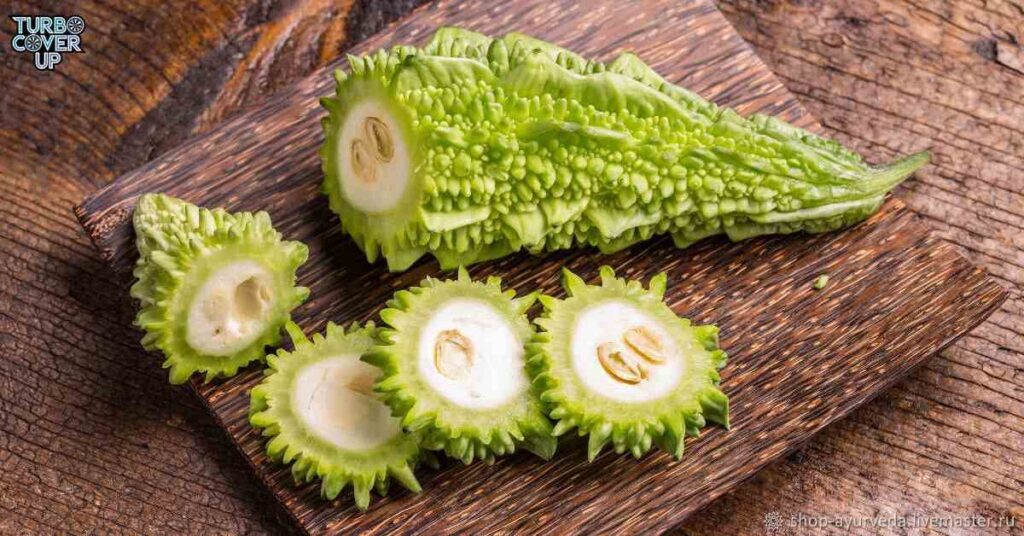Bitter melon, also known as bitter gourd or karela, is a unique vegetable that’s gained popularity in recent years. But as a dog owner, you might be wondering: can dogs eat bitter melon?
In this article, we’ll discuss this difficult question and explore whether this bumpy green veggie is a friend or foe to our furry companions.
Is It Ok for Dogs to Eat Bitter Melon?
The answer isn’t a simple yes or no. While bitter melon isn’t toxic to dogs in small amounts, it’s not the ideal treat for most pups. The potential risks often outweigh the benefits, especially when there are so many other safe and delicious options available.
>>>Read more:
Can Dogs Eat Cream of Mushroom Soup?
What’s the Deal with Bitter Melon?

Bitter melon, scientifically known as Momordica charantia, is a tropical and subtropical vine in the gourd family. It’s prized for its distinctive bitter taste and potential health benefits.
People often use it in cooking or as a natural remedy. But when it comes to our canine friends, things get a bit more complicated.
The bitter melon’s toxicity to dogs isn’t straightforward. While it’s not outright poisonous, it can cause some issues. The key compounds to watch out for are momordicin and charantin. These give bitter melon its signature taste but can spell trouble for your pup’s tummy.
Why We Need to Be Careful
When it comes to feeding our dogs new foods, caution is key. Bitter melon is no exception. Let’s break down the main reasons why we need to tread carefully when considering this veggie for our furry friends.
1. Digestive Discomfort
Digestive distress is the most common issue dogs face when eating bitter melon. The fruit’s compounds can act like a natural laxative. This might sound good, but for dogs, it can lead to upset stomachs, diarrhea, or vomiting.
Dr. Sarah Wooten, DVM, explains, “A dog’s digestive system isn’t equipped to handle bitter melon’s strong compounds. What’s healthy for humans can be harmful to our pets.” So, it’s crucial to watch for any signs of tummy trouble if your dog sneaks a bite.
2. Blood Sugar Fluctuations
Bitter melon is known for its potential to lower blood sugar levels. While this might be beneficial for humans, it can be risky for dogs with diabetes. The vegetable’s effect on blood glucose can interfere with a diabetic dog’s carefully managed insulin levels.
If your pup has diabetes or other health issues, it’s best to steer clear of bitter melon altogether. Always consult your vet before introducing new foods to a dog with health conditions.
3. Choking Hazard
The texture and shape of bitter melon can pose a choking risk, especially for smaller dogs. The seeds and rind are particularly problematic. They’re hard to chew and can get stuck in a dog’s throat.
To minimize this risk, always remove seeds and cut the melon into small, manageable pieces if you decide to offer it to your dog. Better safe than sorry!
4. Unconventional Taste
Let’s face it: bitter melon lives up to its name. Most dogs aren’t fans of bitter flavors. Evolution has taught them to avoid bitter tastes as they often signal poison in nature. Your dog might turn up their nose at bitter melon, making it a less-than-ideal treat option.
If you’re set on sharing, try mixing a tiny bit with their regular food. But don’t be surprised if your pup gives you the “Are you serious?” look.
Can Bitter Melon Offer any Benefits for Dogs?
Despite the potential risks, bitter melon isn’t all bad news for dogs. When offered in moderation and prepared properly, it might provide some health perks. Let’s explore the potential benefits of this controversial veggie.
1. Rich in vitamins and minerals
Bitter melon packs a nutritional punch. It’s loaded with vitamins C and A, as well as potassium and fiber. These nutrients support your dog’s overall health, from boosting their immune system to promoting good digestion.
However, it’s important to remember that dogs can get these nutrients from their regular balanced diet. Bitter melon should never replace their main food source.
2. Potential blood sugar control
Some studies suggest bitter melon might help regulate blood sugar levels. This could be beneficial for dogs with diabetes, but it’s a double-edged sword. The effect can be unpredictable and potentially dangerous if not closely monitored.
Always consult your vet before using any food as a supplement for managing your dog’s health conditions. They can provide guidance on safe and effective ways to support your pup’s well-being.
3. Antioxidant properties
Bitter melon is rich in antioxidants, which can help protect your dog’s cells from damage. These compounds fight harmful free radicals in the body, potentially reducing the risk of certain diseases.
While antioxidant benefits are great, remember that too much of a good thing can be harmful. Moderation is key when it comes to any treat, including bitter melon.
How to Safely Offer Bitter Melon to Your Dog
If you’ve weighed the pros and cons and decided to give bitter melon a try, here’s how to do it safely:
1. Start with a tiny piece
Begin with a pea-sized amount of bitter melon. This allows you to gauge your dog’s reaction without risking major digestive upset. Watch for any signs of discomfort or allergic reactions over the next 24 hours.
If all goes well, you can gradually increase the amount. But remember, bitter melon should never make up more than 10% of your dog’s daily calorie intake.
2. Remove the seeds and skin
Always prepare bitter melon properly before offering it to your dog. Remove all seeds and peel off the skin. These parts are the most bitter and can be hard to digest.
Chop the flesh into small, manageable pieces to prevent choking. This extra effort goes a long way in making bitter melon safer for your pup.
3. Offer it raw or cooked
You can offer bitter melon to your dog either raw or cooked. Raw bitter melon retains more nutrients but can be harder to digest. Cooking can make it easier on your dog’s stomach and might even improve the taste.
If cooking, stick to steaming or boiling without any added oils or seasonings. Avoid frying or using spices that could upset your dog’s tummy.
When Bitter Isn’t Better: Signs Your Dog’s Not a Fan
Sometimes, despite our best intentions, certain foods just don’t agree with our furry friends. It’s important to recognize when bitter melon isn’t sitting well with your dog. Here are some signs to watch out for:
- Excessive drooling
- Vomiting or diarrhea
- Loss of appetite
- Lethargy or unusual behavior
- Abdominal pain or discomfort
If you notice any of these symptoms after feeding your dog bitter melon, it’s best to stop offering it and consult your veterinarian. Every dog is unique, and what works for one might not work for another.
Conclusion
Bitter melon may have some potential health benefits, it’s crucial to be cautious when considering it for your dog. Dogs can experience digestive discomfort, blood sugar fluctuations, and even choking hazards from this gourd. If you want to offer it, ensure you prepare it safely and introduce it gradually.
Always consult your vet, especially if your dog has underlying health issues like diabetes. By prioritizing your dog’s health and safety, you can make informed choices about their diet. Keeping your furry friend safe is always the best approach.
Frequently Asked Questions
Can dogs eat bitter melon?
Yes, dogs can eat bitter melon in small amounts, but it’s not the best treat for them.
What problems can bitter melon cause for dogs?
Bitter melon can lead to digestive issues, blood sugar fluctuations, and choking hazards.
How should I prepare bitter melon for my dog?
Always remove the seeds and skin, and chop the flesh into small pieces before offering it to your dog.
Are there any health benefits of bitter melon for dogs?
Bitter melon contains vitamins and antioxidants, but these benefits can also be found in a balanced dog diet.
What signs indicate my dog doesn’t like bitter melon?
Signs include excessive drooling, vomiting, diarrhea, or unusual behavior after eating bitter melon.

